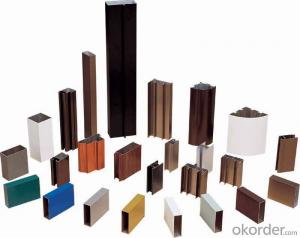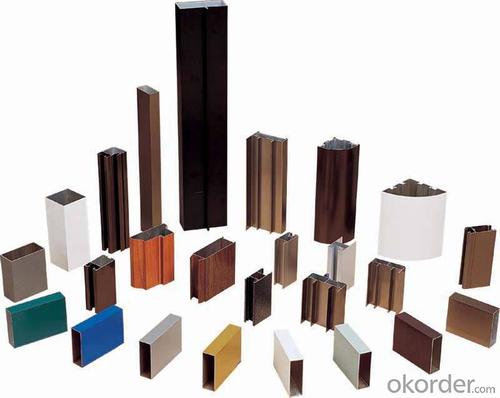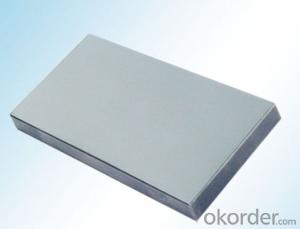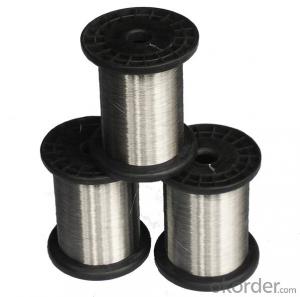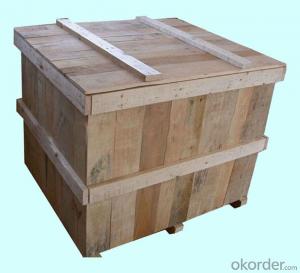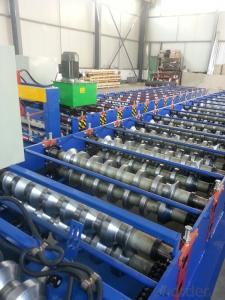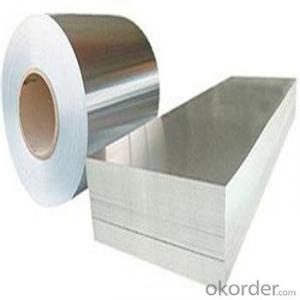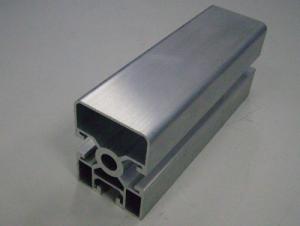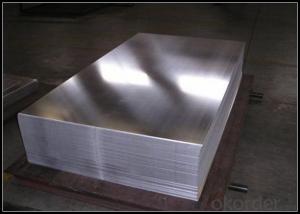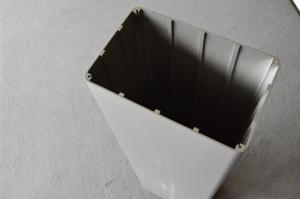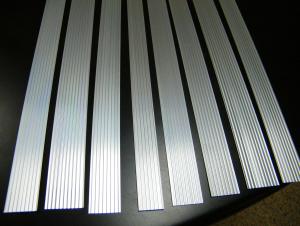Aluminum Siding 4x8 Sheets - Aluminum Extrusion/Profiles for Doors SAD4-404-5
- Loading Port:
- Shanghai
- Payment Terms:
- TT OR LC
- Min Order Qty:
- 20 m.t.
- Supply Capability:
- 2000 m.t./month
OKorder Service Pledge
OKorder Financial Service
You Might Also Like
1.Structure of Aluminum Extrusion/Profiles for Doors SAD4-404-5 Description:
Anodizing (also spelled anodising, particularly in the UK and Australia) is an electrolytic passivation process used to increase the thickness of the natural oxide layer on the surface of metal parts. Anodized aluminium surfaces, for example, are harder than aluminium but have low to moderate wear resistance that can be improved with increasing thickness or by applying suitable sealing substances.
2.Main Features of the Aluminum Extrusion/Profiles for Doors SAD4-404-5:
High corrosion-resistance;
weather-resistance;
heat-resistance;
alkali-resistance and impact-resistance properties.
3.Aluminum Extrusion/Profiles for Doors SAD4-404-5 Images:
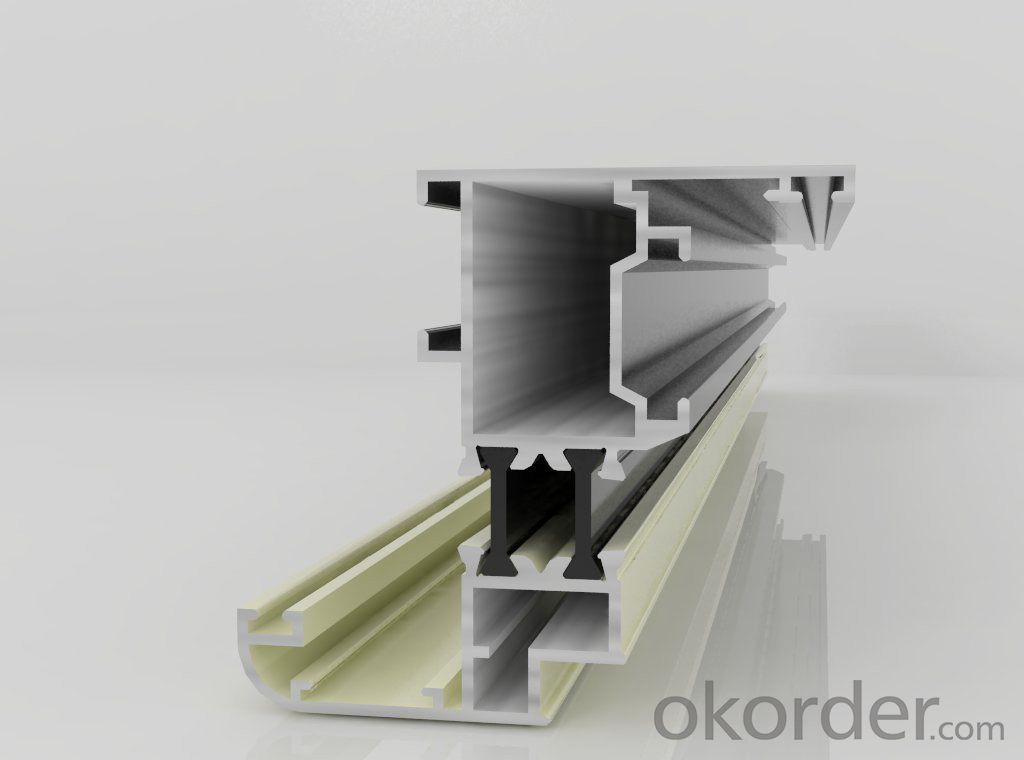
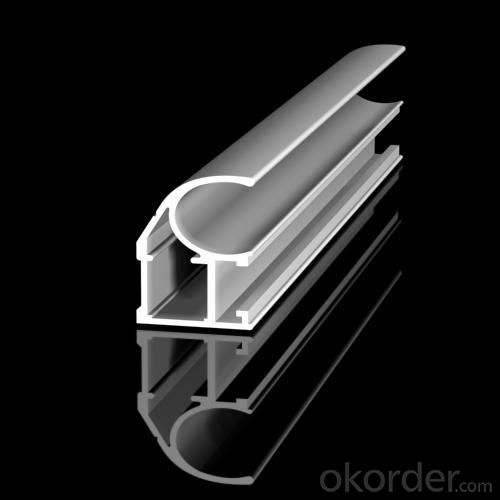
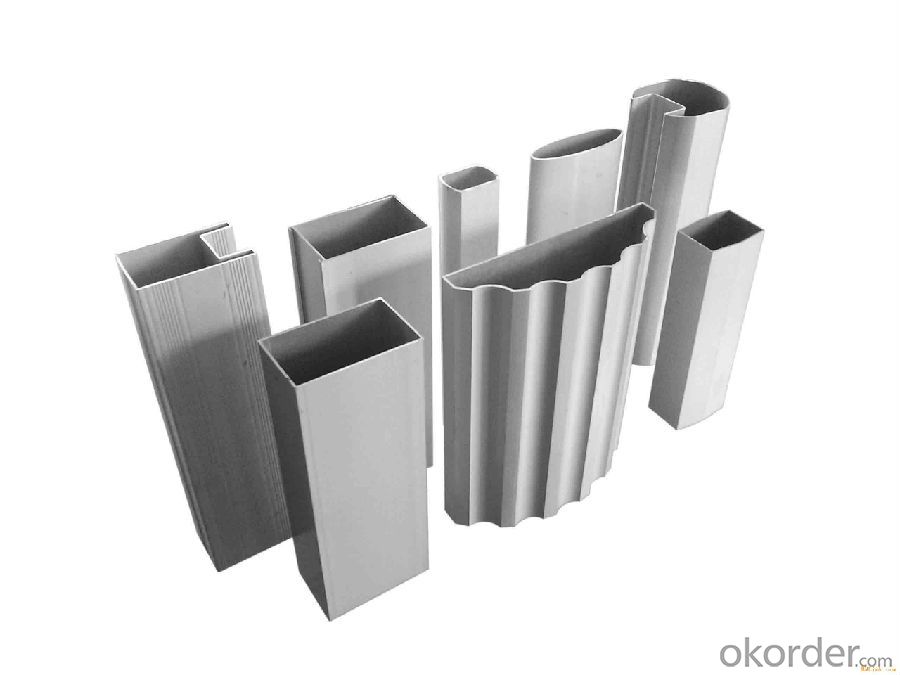
4.Aluminum Extrusion/Profiles for Doors SAD4-404-5Specification:
1. Material: 6063,6061,6060,6005,6005A,etc.
2. Temper: T5 or T6
3. Finish: Mill finish, anodizing, powder coating, electrophoresis, wooden transfer or pvdf/carbon-flouride coated, polishing, brushing, sand blasting
4. Various colors: Silver, bronze, black, gold, blue, grey, champagne, bright, etc.
5. Machining: Cutting, punching, drilling, tapping, milling, bending, welding, CNC etc.
5.FAQ:
① How about your company?
A world class manufacturer & supplier of castings forging in carbon steel and alloy steel,is one of the large-scale professional investment casting production bases in China, consisting of both casting foundry forging and machining factory. Annually more than 8000 tons Precision casting and forging parts are exported to markets in Europe, America and Japan. OEM casting and forging service available according to customer’s requirements.
②How to guarantee the quality of the products?
We have established the international advanced quality management system,every link from raw material to final product we have strict quality test;We resolutely put an end to unqualified products flowing into the market. At the same time, we will provide necessary follow-up service assurance.
- Q: How do aluminum sheets perform in terms of heat reflectivity?
- Aluminum sheets exhibit remarkable heat reflectivity, making them exceedingly efficient. Their ability to effectively deflect heat and light away from surfaces minimizes heat absorption, thus rendering them perfect for scenarios where heat control is paramount, like roofing, insulation, and solar panels. The reflective quality of aluminum sheets aids in curbing energy consumption by preventing excessive heat accumulation, leading to a cooler atmosphere. Moreover, the reflectivity of aluminum also lends itself to a multitude of industrial and scientific applications, including the production of reflectors, heat sinks, and optical mirrors.
- Q: Can aluminum sheets be used for cookware?
- Yes, aluminum sheets can be used for cookware. Aluminum is a popular material for cookware due to its excellent heat conductivity and lightweight properties. Aluminum sheets are often used as the base or core material in the construction of cookware, such as pots, pans, and baking sheets. They are typically coated with a nonstick or ceramic layer for added durability and ease of use. However, it is important to note that pure aluminum is reactive with certain acidic or alkaline foods, which can cause a metallic taste or discoloration. To prevent this, most aluminum cookware is anodized or coated to create a barrier between the food and the aluminum surface. Overall, aluminum sheets are a versatile and commonly used material for cookware in both professional and home kitchens.
- Q: Can aluminum sheet withstand heavy loads?
- Yes, aluminum sheet can withstand heavy loads. Aluminum is known for its high strength-to-weight ratio, making it an excellent choice for applications that require durability and load-bearing capabilities. Aluminum sheets are commonly used in industries such as aerospace, automotive, construction, and marine, where heavy loads are involved. Additionally, aluminum's inherent corrosion resistance further enhances its ability to withstand heavy loads over extended periods. However, it is important to consider the specific grade and thickness of the aluminum sheet, as different alloys and thicknesses have varying load capacities.
- Q: How does the surface roughness affect the adhesion of coatings on aluminum sheet?
- The adhesion of coatings on aluminum sheet is greatly influenced by the surface roughness. How rough the sheet's surface is directly impacts the mechanical interlocking between the coating and the substrate, which is vital for strong adhesion. When the aluminum sheet's surface is smooth, the contact area between the coating and the substrate is limited, resulting in weak adhesion. Conversely, a rough surface provides more contact points, enhancing the interlocking between the coating and the aluminum sheet, resulting in improved adhesion strength. Moreover, a rough surface facilitates better wetting of the coating material on the aluminum sheet. This means that the coating material can easily spread across the surface, filling any gaps or crevices and creating a more uniform and continuous coating. This improved wetting contributes to enhanced adhesion. Furthermore, a rough surface can also increase the overall surface area of the aluminum sheet. A larger surface area allows for more available space for the coating material to adhere to, thus increasing the adhesion strength. It is important to note that there is an optimal level of roughness required to achieve the best adhesion. Excessive roughness may result in incomplete coverage of the coating material or the formation of voids, reducing adhesion. Therefore, finding the right balance of roughness is essential to ensure optimal adhesion of coatings on aluminum sheet.
- Q: Aluminium magnesium alloy plate, 5052 aluminium plate, 5005 aluminium plate. 5252 aluminum plate performance and use
- Electronic cabinet material and LED LCD TV backlight board
- Q: This question asks for an explanation of the various grades of aluminum sheets and the distinctions between them.
- <p>Aluminum sheets are categorized into different grades based on their alloy composition, which affects their properties such as strength, formability, and corrosion resistance. Common grades include 1000 series (99.00% aluminum, soft and malleable), 2000 series (aluminum-copper alloys, strong and heat treatable), 3000 series (aluminum-manganese alloys, good formability), 5000 series (aluminum-magnesium alloys, good strength and corrosion resistance), and 6000 series (aluminum-silicone-magnesium alloys, good strength and extrudability). Each grade has specific applications based on its characteristics, with 1000 series used for general purposes, 2000 series for aircraft structures, 3000 series for decorative applications, 5000 series for marine environments, and 6000 series for structural components.</p>
- Q: Can aluminum sheets be used for insulation jackets?
- Indeed, insulation jackets can indeed employ aluminum sheets. Aluminum possesses exceptional thermal conductivity characteristics, enabling it to proficiently deflect heat and hinder the transmission of thermal energy. Consequently, it becomes the perfect substance for insulation jackets, as it aids in preserving temperature regulation and reducing heat loss or gain. Furthermore, aluminum sheets are lightweight, long-lasting, and impervious to corrosion, rendering them a pragmatic option for insulation applications.
- Q: What is the maximum temperature that the aluminum sheets can withstand?
- The specific grade of aluminum used determines the maximum temperature that aluminum sheets can endure. In general, most aluminum alloys maintain their structural integrity up to temperatures ranging from 600 to 650 degrees Fahrenheit (315 to 343 degrees Celsius). However, it is crucial to recognize that extended exposure to high temperatures may result in aluminum weakening, deforming, or even melting. Consequently, it is advisable to refer to the manufacturer's specifications or testing data for the particular aluminum grade in order to ascertain its maximum temperature tolerance.
- Q: i bought a light fixture for my bathroom wall and the ground wire is aluminum and the existing ground wire in the wall is copper,so i would like to know if i can join them and if so,how?
- Yes, in this case. Long ago, house wiring was allowed with aluminum wiring. But, shorts were resulting from dissimilar metals touching, while conducting large current and in the presence of electrolitic moisture. The dissimilar metals touching was a problem due to electrolytic corrosion taking place- any time two dissimilar metals come in contact in the presense of an electrolytic solution, corrosion takes place. However, in your case, you are connecting a ground wire, that does not normally conduct- it will only conduct in case of a short or other failure to ground. You are not installing this in a place where salty, moist air is a concern (the electrolyte)- so, it's okay.
- Q: What are the applications of aluminum sheet?
- Aluminum sheets have a wide range of applications due to their various desirable properties. They are commonly used in the aerospace industry for aircraft construction, as well as in the automotive industry for body panels and structural components. Aluminum sheets are also used in the construction industry for roofing, siding, and insulation purposes. Additionally, they are utilized in the packaging industry for cans and foils, and in the electrical industry for wiring and conductors.
Send your message to us
Aluminum Siding 4x8 Sheets - Aluminum Extrusion/Profiles for Doors SAD4-404-5
- Loading Port:
- Shanghai
- Payment Terms:
- TT OR LC
- Min Order Qty:
- 20 m.t.
- Supply Capability:
- 2000 m.t./month
OKorder Service Pledge
OKorder Financial Service
Similar products
Hot products
Hot Searches
Related keywords
